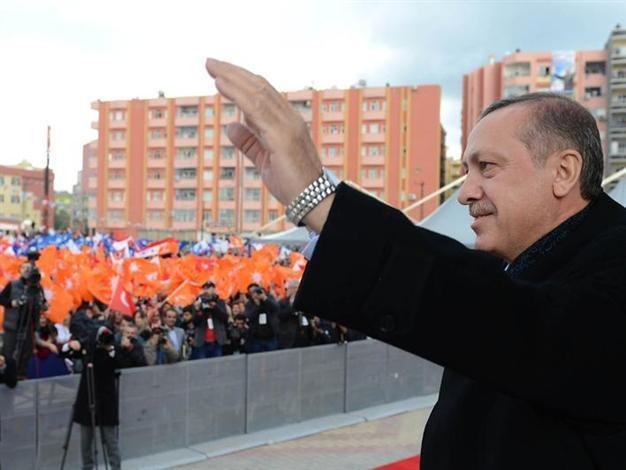Turkey enters key week in Kurdish solution bid
ANKARA

Turkish Prime Minister Recep Tayyip Erdoğan is on a visit to souteastern province of Mardin. AA photo
Turkey is entering one of its most crucial weeks in its efforts to solve the Kurdish question amid expectations surrounding new judicial reforms and visits to the Kurdistan Workers’ Party (PKK) leader, but the premier has warned against possible sabotage.The significance of this week is due in part to expectations that the government is expected to complete its deliberations on the fourth judicial package before submitting it to Parliament, which could result in the releases of many jailed Kurdish politicians, as well as anticipation of a second meeting between a Peace and Democracy Party (BDP) delegation and Abdullah Öcalan, the imprisoned leader of the PKK. Prime Minister Recep Tayyip Erdoğan was set to decide on the names of the BDP delegation late yesterday.
“A very big atmosphere of hope has developed across all of Turkey. Believe me, this crowd today is voicing hope the way [the Black Sea province of] Rize is voicing it. Istanbul and Ankara are as hopeful as you are. Let’s not waste this hope. Let’s not allow those who would kill this process [to succeed],” Erdoğan said yesterday during an address to voters in the southeastern province of Mardin.
Erdoğan spent the weekend in the province, where he attended the opening ceremonies of numerous projects accompanied by several ministers, including his new interior minister, Muammer Güler, who is from the area.
Following days of uncertainty as to the date of the BDP’s second visit to İmralı island, where Öcalan is serving a life sentence, Justice Minister Sadullah Ergin announced that it could occur this week after he receives an official application from the BDP. Erdoğan said yesterday morning that the names had been provided to the government and that they would provide a decision later in the day. The peace process is being coordinated by the National Intelligence Organization (MİT), which has been in constant talks with Öcalan since December 2012.
Kurdish lawmakers Ahmet Türk and Ayla Akat Ata conducted the first visit to Erdoğan on Jan. 3, but Erdoğan vetoed Türk for the second visit because he subsequently criticized military strikes in the southeast. The BDP has pressed for the delegation to include one of the party’s co-chairpersons, Selahattin Demirtaş or Gültan Kışanak, but the latter is said to have no chance of going after being photographed embracing militants last summer. Alongside Demirtaş, BDP deputy Pervin Buldan is in the running to join the delegation.
Equally important is that the government completes the necessary procedures on the fourth judicial package, which could effect the release of many Kurdish politicians who have been arrested as part of the Kurdistan Communities’ Union (KCK) case. It is believed that a great majority of KCK suspects will be released pending trial as a result of the fourth judicial package. Ergin confirmed that KCK detainees would benefit from the package as it amends an anti-terror law in accordance with European Court of Human Rights norms. There are 5,000 to 6,000 KCK suspects behind bars.
No Turkishness or Kurdishness
In his rallies in Mardin over the weekend, Erdoğan reiterated that he was against all sorts of nationalism, saying: “We are into the solution process. No one should come to us with Kurdishness or Turkishness in this process. We are a government that disregards all sorts of nationalism. Those who claims that his or her race is superior than others is in the footprints of evil.”
The ruling Justice and Development Party (AKP), in contrast, is patriotic, rather than nationalist, he said.
“The Turkish Republic is one nation on this soil,” Erdoğan said. “That one nation includes everyone. Whoever pursues ethnic nationalism is of ill-intent. No one should come to us regarding being Turks or being Kurds. We have no separatism or divisions. Our nationalism is about patriotism and about humanism,” Erdoğan said.
Speaking on the issue of terrorism in the region, Erdoğan mentioned a new form of “national unity and brotherhood” project that called for the end of guns and violence and the triumph of the political will. “We have started a process to allow an opportunity for politics. The south will have the same rights as the west. The solution to the problem involves providing the same rights for everyone.”
Deputy Prime Minister Bekir Bozdağ also responded to criticisms that his government was acting slowly on the peace process given that no visits to İmralı had been conducted for several weeks and that a second had yet to be definitively scheduled.
“There is no timetable for the solution process,” he said in an interview with private channel Kanal 7 yesterday.
“What is essential is that we obtain a result from this process. The right thing to do is to advance in a way to get a result from this process and not to move speedily,” Bozdağ said. “People tell us to stop the terror. ‘End this how no matter how you do it, end bloodshed;’ they tell us. They don’t impose on us a certain method.”
















